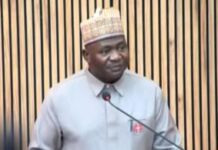Uba Sani, governor of Kaduna state, says intelligence collaboration remains the most effective tool for addressing security threats in the North-West region and beyond.
The governor stated this on Thursday in Kaduna while declaring open a conference of State Directors of the Department of State Services (DSS) in the North-West.
Represented by Sule Shuaibu (SAN), Commissioner for Internal Security and Home Affairs, the governor emphasized the crucial role the DSS has been playing in safeguarding democracypreempting threats across the federation.
He said the conference provided an opportunity for reflection, coordination, and strategic renewal.
He said his administration has consistently prioritized intelligence-driven approaches by partnering closely with the DSS and other security agencies to detect and disrupt threats ranging from violent extremism and sabotage to misinformation.
According to Sani, “modern security management requires more than traditional intelligence gathering.”
He called for greater investment in analytical capacity, inter-agency trust, and technology-driven intelligence systems.
The governor also urged security heads to embrace non-kinetic methods of peace building, “including community engagement, preventive diplomacy, and counter-narrative strategies.”
“Peace must be pursued through justice, development, and inclusion,” he added.
In his remarks, Ahmed Bamalli, Emir of Zazzau, commended the DSS for its cooperation with traditional institutions in addressing community disputes and security threats.
He disclosed that, through alternative dispute resolution mechanisms facilitated with DSS support, the Zazzau Emirate had successfully decongested its courts by over 2,000 cases in two years.
The monarch also praised the agency’s vetting of district and village heads, noting that the process has helped identify and remove unfit traditional officials.
Earlier, in his welcome address,
Hakeem Abiola, Kaduna State Director of the DSS, said the zonal meeting was convened to review operational challenges and improve synergy among security formations across the North-West zone.
Abiola noted that the DSS, under the leadership of Oluwatosin Ajayi, its Director-General, has successfully implemented several kinetic and non-kinetic operations, including community-based peace initiatives.
He highlighted the service’s collaboration with traditional rulers, religious leaders, and civil society organizations as central to sustaining peace in Kaduna.
“Through regular engagements with JNI, CAN, and community leaders, we’ve been able to resolve sensitive disputes before they escalate,” he said.
The Kaduna DSS Director also noted that the Kaduna Peace Model has significantly reduced kidnapping and banditry along the Kaduna–Abuja, Kaduna–Kachia, and Birnin Gwari highways.
He added that the service, in collaboration with other agencies, had intercepted arms shipments, rescued kidnapped victims, and foiled terror plots across the region, with many of the operations carried out discreetly
Abiola further called for the creation of a regional security forum involving security chiefs, traditional rulers, and political leaders to confront cross-border crimes and terrorism, stressing that “as threats evolve, our capacity and tools must evolve too.”
The conference was also attended by representatives from the neighbouring Federal Capital Territory (FCT), Niger, and Plateau states.










